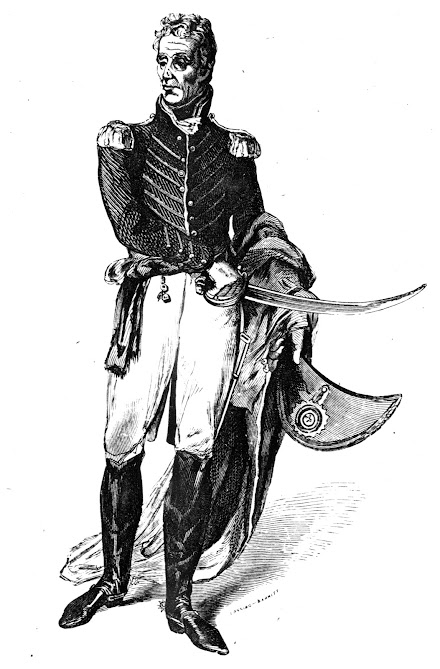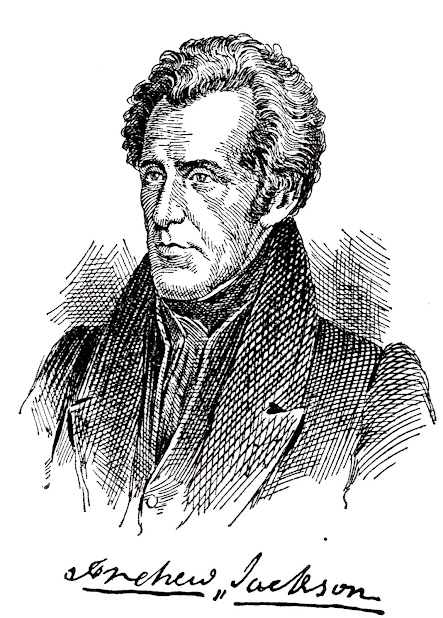March 27: The Battle of Horseshoe Bend is just as bloody as the fight at Fort Mims (1813), and the butchery equally terrible, but results reversed.
NOTE TO TEACHERS: It is telling that historians call one a “battle”
and the other a “massacre.”
 |
| General Andrew Jackson. |
Sam Houston is a young man in this fight, and is wounded by “a barbed arrow.” Coffin says the soldiers sent a messenger to offer to spare all the Creeks who surrendered,
but
the Creeks, instead of surrendering, shot the messenger. The exasperated
soldiers then shot them down without mercy. Of the one thousand Indian
warriors, all except two hundred were killed. Jackson lost one hundred and
twenty-five. The chief, Weatherford [a man of mixed white and native parentage,
also known as “Red Eagle”], escaped on a horse; but he could fight no longer – nearly
all his warriors had been killed.
Five days later, Weatherford,” a brave and humane” man, according to Coffin, surrendered to General Jackson:
“I
am Weatherford,” he said. “I have nothing to request for myself – you can kill
me; but I came to beg for the lives of the women and children, who are starving
in the woods. I hope you will send out parties to bring them in and feed them.
I did what I could to prevent the massacre at Fort Nims [Mims]. I have fought
the United States; if I had an army I would still fight, but I have not. I ask
nothing for myself. I am your prisoner. For my people, I can only weep over
their misfortunes.”
General
Jackson admired him; but there was no safety for the brave man even under
General Jackson’s protection. The relatives of those who had been massacred at
Fort Nims thirsted for his blood. He was obliged to flee; but when the war with
England was over he returned, and became a respected citizen of Alabama. (72/210)
While other sources also put Creek losses at a thousand – including
800 warriors – it would be almost a certainty that many more of
the dead, than just two hundred, were women and children.
*
August 9: British naval forces bombard Stonington, Connecticut and leave the town in smoking ruins.
John Bach McMaster provides more detail:
Fighting along the Seaboard. –
During 1812 and 1813 the British did little more than blockade our coast from
Rhode Island to New Orleans, leaving all the east coast of New England
unmolested. But in 1814 the entire coast was blockaded, the eastern part of
Maine was seized and occupied, and Stonington, Connecticut was bombarded.*
*In New England the ruin
of commerce made the war most unpopular, and it was because of this that the
British did not at first blockade the New England coast. British goods came to
Boston, Salem, and other ports in neutral ships, or in British ships disguised
as neutral, and great quantities of them were carried in four-horse wagons to
the South, whence raw cotton was brought back to New England to be shipped
abroad. The Republicans made great fun of this “ox-and-horse-marine.”
 |
Home in Stonington. |
 |
A park in remembrance of the raid and defense. |
*
The “Bladensburg races.”
August 24: With a British invasion force threatening D.C., Monroe helps officers, including General Tobias E. Stansbury, position a line of troops in a wide arc, on rising ground, at Bladensburg, facing a bridge across the East Branch, which the enemy would have to cross. When General William Winder arrived at noon he positioned his troops a mile behind the first line, higher up the hill. President Madison also arrived, and rode his horse so far forward that he had to be stopped before crossing into British lines.
Ammon describes the fight:
The
engagement at Bladensburg, which nominally lasted from one until four in the
afternoon, was really over almost as soon as it began. The militia units in the
front line broke and ran after the first shots were fired. Much of the panic
was generated by the unfamiliar Congreve rocket, a relatively harmless but
disconcerting weapon. The collapse of the front line set up a chain reaction
affecting all the other units. Within a half-hour after the battle began, as
Stansbury’s men poured into the rear, Winder ordered a general retreat in the
hope that he could reorganize the army outside Washington. The British were
held back two hours by Commodore Joshua Barney and an attachment of marines and
sailors, whose telling artillery fire delayed the advance. Winder’s plan proved
unworkable as the retreat turned into a chaotic route – the “Bladensburg races”
were underway. It seemed incredible that an army of 7,000 occupying a defensive
position had retreated before a force of 4,000 men without artillery or cavalry.
The American humiliation was all the greater, for the flight had begun before
Ross’s main force had been brought into action. (24/333)
After Washington was
attacked, President Madison had to flee, looking “miserably shattered and
wo-begone.” It is said he spent one night in a hen house. By this time the U.S.
government was bankrupt. The British offered peace terms: but the Northwest Territory
would have become a neutral buffer state. About a third of American territory
would have to be ceded.
*
September
11: A second British invasion is halted
in the Battle of Lake Champlain, a decisive American victory.
*
September 27: Secretary of War John Armstrong Jr. is replaced
by Monroe, who took to sleeping on a camp bed in his War Department office, so
that he would be always on hand to receive dispatches. In the fall of 1814, the
U.S. army numbered only 30,000 men, half of the force that Congress had
approved.
*
December: At the Hartford Convention, the New England states flirt with secession, stating,
In
cases of deliberate, dangerous and palpable infractions of the Constitution,
affecting the sovereignty of a State and the liberties of the people; it is not
only right but the duty of such a State to interpose its authority for their
protection, in the manner best calculated to secure that end.
Van Loon explains that with Napoleon seemingly defeated once and for all, and confined to the island of Corsica, the full military might of Great Britain could finally be turned on the United States.
At last the British government
had its hands free and was able to gather an army of veterans in Montreal and
Quebec for the recapture of the rebellious American provinces. But just when
everything was set for the great campaign, the Corsican monster escaped to the
European mainland and England was once more called upon to deliver her quota of
allied troops. After the victory of Waterloo and the conclusion of the peace of
Paris, when one out of every seven people in England had been reduced to the
state of a pauper by the uninterrupted decade of war, it seemed absurd and
wicked to continue a conflict in which no one was really interested. Besides,
now that Napoleon had been sent to St. Helena, the greater part of the British navy
had become superfluous and there was no longer any need for pressing foreign
sailors into the service of His Majesty.
*
December 24: The Treaty of Ghent is signed in Europe. Van Loon sums up the results this way. The war had “changed absolutely nothing and left everything as it had been four years previously.” (124/291)
Ammon offers a more positive summary:
Although the war was at best an ignoble
stalemate in which the nation had only been saved from disaster by the decision
of Britain not to prosecute the war on a massive scale, the conflict was at
once portrayed in popular mythology as a victory, which had again proven the
effectiveness of the valor of a free people in a contest against the world’s
mightiest power. To many it seemed a second war of independence. (24/343)
With no way to communicate quickly, on this side of the Atlantic, no one knows that peace is at hand.
Coffin explains:
The invasion of New Orleans took shape, as did the defense. Gen. Jackson was happy to learn that 2,000 Kentuckians had come to join him, but shocked to find only 700 had rifles. “I don’t believe it,” he fumed. “I have never seen a Kentuckian without a gun and a pack of cards and a bottle of whiskey in my life.”



